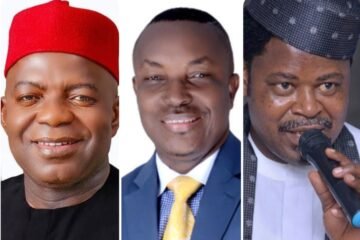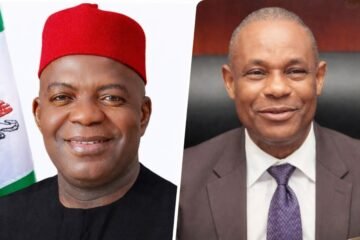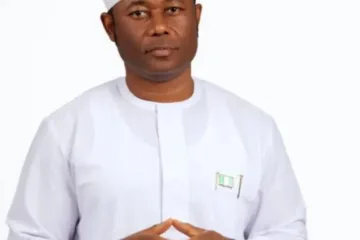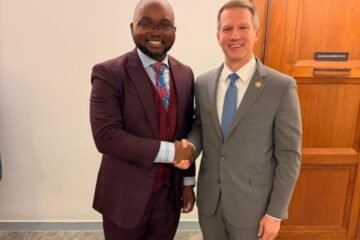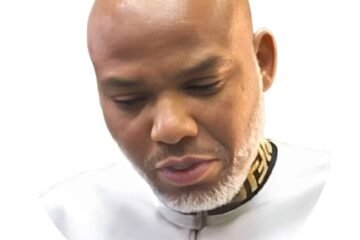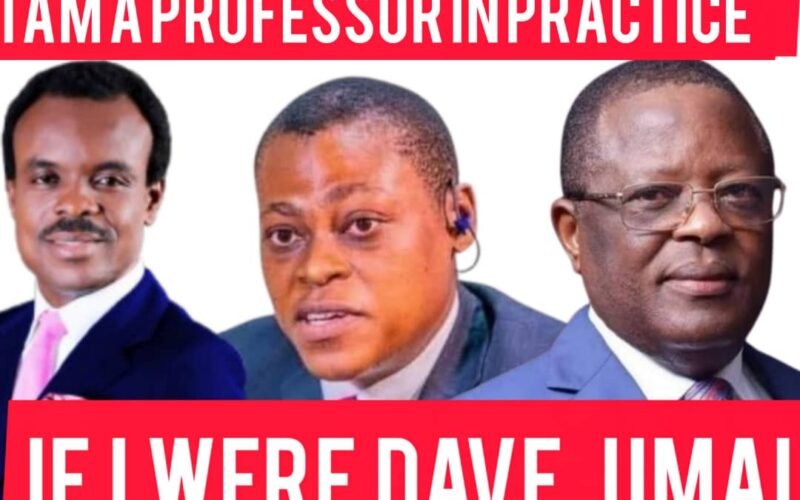By BARRISTER IKENNA EMMANUEL -8TH October 2025
When Rufai Useni of Arise TV asked the Honourable Minister of Works, Engr. Dave Umahi, a straightforward professional question about road construction and measurements, the interview suddenly turned dramatic. Rufai, known for his sharp and detailed questions, merely sought clarification on the cost per kilometre of the ongoing Lagos–Calabar Coastal Highway Project — a fair and professional question any engineer or project manager should comfortably address.
Instead, Umahi raised his voice and declared: “I am a Professor in practice!” That moment went viral. Nigerians flooded social media, laughing and mocking him. Many sneered: “Professor of what?” Others argued, “There’s nothing like a Professor in Practice!”
But before joining the mockery, it is important to understand the deeper meaning of professionalism and the global concept of a Professor in Practice.
If I Were Minister Dave Umahi
If I were the Honourable Minister appointed by President Bola Ahmed TINUBU, I would have responded calmly and confidently, saying:
“Your question is absolutely and professionally on point.
For any engineering project to be mobilized to site, you must first have the following foundational documents:
Detailed Engineering Design (DED)
Approved for Construction Drawing (AFCD)
Bill of Engineering Measurement and Evaluation (BEME)
These documents reveal the technical and cost realities before project commencement. Hence, the cost per kilometre can be accurately ascertained.
During execution, there may be a need for a Revised Estimated Total Cost (RETC) due to inflation, design adjustments, or terrain factors, but that does not stop the Minister — even as a Professor in Practice — from stating the baseline cost per kilometre.
Even the Holy Bible, in Luke 14:28–30, teaches that before one builds a tower, he must first estimate the cost and plan to complete it.
Therefore, for any Minister to say that sections of a major coastal highway were not designed before construction is professionally worrisome.”
I don’t have business with his decision not to divulge such sensitive monetary expenses on a global media. My interest is I. His PROFESSIORAL PRACTICE nomenclature!!
Also, If I was minister DAVE, I would have replied to Rufai with a smile. As a political appointee, I have restricted rights to divulge certain government policies and expenditures. Even in the United States, there are categories known as “Classified Expenditures” or the “Black Budget” — funds for covert operations that are not disclosed to the public for security reasons.
So, I would have smiled, acknowledged his professional concern, and then delivered a precise engineering point — a “light punch” of fact and clarity — underscoring the planning, measurements, and documents that always precede major infrastructure. That measured, confident approach both protects sensitive details and demonstrates competence.
That is how a Professor in Practice should respond — with mastery, composure, and controlled authority.
Give it to him , Dave Umahi studied Civil Engineering and graduated in 1987.
Soon after, by 1988 or 1989, he began working as a practicing engineer.
Thus, by 2025, he has about 36 to 37 years of engineering experience behind him — a substantial record of real, professional practice.
With that depth of experience, his claim to being a Professor in Practice is more than just rhetorical — it is anchored in decades of field work, management, project delivery, and engineering mastery.
However, probably he wasn’t prepared for the interview??
Here are real examples of people who hold the title Professor of Practice (or similar) in those institutions:
T. Alan Hatton — Ralph Landau Professor of the Practice at MIT (Chemical Engineering)
Bill Aulet — Professor of the Practice at MIT Sloan (Entrepreneurship)
Stephen Blyth — Professor of the Practice of Statistics at Harvard
Andrew Baum — Professor of Practice at Oxford’s Saïd Business School
These individuals bring professional excellence into academia, demonstrating that the title is not foreign — it’s part of how top universities globally integrate practice with teaching.
What Is a Professor in Practice vs. Academic Professor?
An academic professor earns their title through teaching, research, publishing, and supervising students in a university environment. Their contributions are measured in theories, peer review, and academic advancement.
A Professor in Practice, by contrast, earns recognition through professional mastery, leadership, and real-world impact. They may not publish many papers, but their value lies in the projects they’ve led, policies they’ve shaped, and systems they’ve built.
The academic professor builds knowledge; the professor in practice applies it. Both roles are vital, and many times they overlap.
Why Nigerians Often Mock What They Don’t Understand
In Nigeria, the term “Professor” is almost always tied to academia — lecture halls, research chairs, universities. Because of that limited frame, when someone claims to be a Professor outside those bounds, many jump to ridicule.
But in the developed world, it is common for universities to appoint Professors of Practice — former CEOs, engineers, policymakers — exactly because they bring real-world insight that textbooks cannot. Their mission is to bridge knowledge and application, theory and results.
So when Dave Umahi said, “I am a Professor of practice” many misunderstood. He was asserting not academic seniority, but professional authority, earned over decades of work.
Furthermore, The legal profession in Nigeria offers a clear parallel. Senior Advocate of Nigeria (SAN) can be granted to two kinds of professionals:
Those who earn it through academic distinction — writing, teaching, scholarship.
Those who earn it through practice — courtroom victories, reputation, advocacy, impact.
Both are legitimate paths to excellence. So also, one may be a Professor by academic research or a Professor by professional practice — or even both.
If I were Minister Dave Umahi, I would have used that interview as a teaching moment — not to raise my voice, but to deliver clarity.
Being a Professor in Practice isn’t about boasting a title. It’s about having transformed your field, mentored others, and left a legacy through real work.
You may not always hold a chalk, but if your engineering, leadership, or policy work has reshaped systems, built infrastructure, and changed lives — then yes, you are a Professor in Practice.
The true test of professorship is not the diploma you display. It is the difference you make.
Authored by -Barrister Reverend Ikenna Emmanuel
Lawyer, Leadership Strategist & Government Expert
+2348035003594
All Correspondence – ikennaemmanuel1977@gmail.com
All Copyright Reserved -2025

